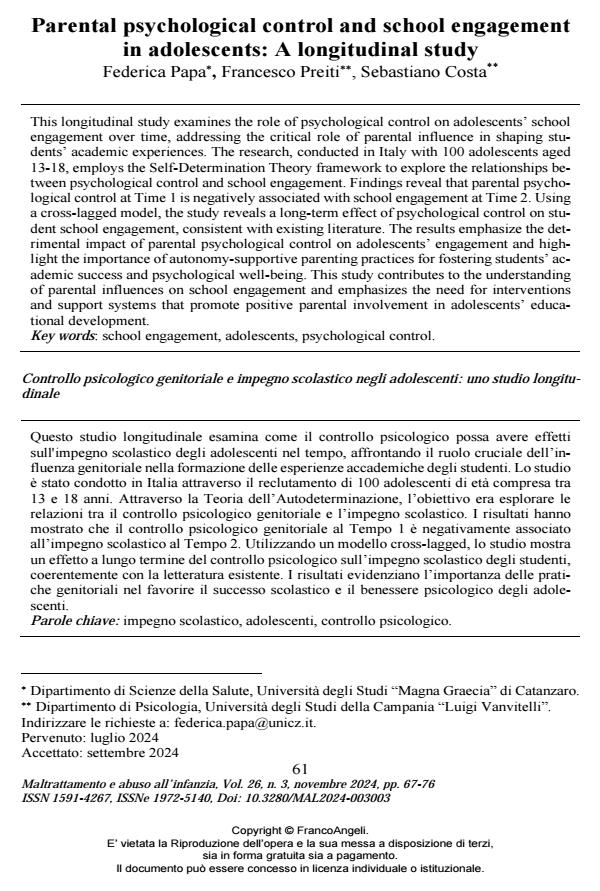Controllo psicologico genitoriale e impegno scolastico negli adolescenti: uno studio longitudinale
Journal title MALTRATTAMENTO E ABUSO ALL’INFANZIA
Author/s Federica Papa, Francesco Preiti, Sebastiano Costa
Publishing Year 2024 Issue 2024/3
Language English Pages 16 P. 61-76 File size 246 KB
DOI 10.3280/MAL2024-003003
DOI is like a bar code for intellectual property: to have more infomation
click here
Below, you can see the article first page
If you want to buy this article in PDF format, you can do it, following the instructions to buy download credits

FrancoAngeli is member of Publishers International Linking Association, Inc (PILA), a not-for-profit association which run the CrossRef service enabling links to and from online scholarly content.
This longitudinal study examines the role of psychological control on adolescents’ school engagement over time, addressing the critical role of parental influence in shaping students’ academic experiences. The research, conducted in Italy with 100 adolescents aged 13-18, employs the Self-Determination Theory framework to explore the relationships between psychological control and school engagement. Findings reveal that parental psychological control at Time 1 is negatively associated with school engagement at Time 2. Using a cross-lagged model, the study reveals a long-term effect of psychological control on student school engagement, consistent with existing literature. The results emphasize the detri-mental impact of parental psychological control on adolescents’ engagement and highlight the importance of autonomy-supportive parenting practices for fostering students’ academic success and psychological well-being. This study contributes to the understanding of pa-rental influences on school engagement and emphasizes the need for interventions and sup-port systems that promote positive parental involvement in adolescents’ educational devel-opment.
Keywords: school engagement, adolescents, psychological control.
- The Mediating Role of Dispositional Optimism and Perfectionism on the Relationship Between Perceived Parental Psychological Control and Support and Adolescents’ Well-Being Luana Sorrenti, Maria Imbesi, Carmelo Francesco Meduri, Angelo Fumia, Pina Filippello, in European Journal of Investigation in Health, Psychology and Education /2025 pp.160
DOI: 10.3390/ejihpe15080160
Federica Papa, Francesco Preiti, Sebastiano Costa, Parental psychological control and school engagement in adolescents: A longitudinal study in "MALTRATTAMENTO E ABUSO ALL’INFANZIA" 3/2024, pp 61-76, DOI: 10.3280/MAL2024-003003